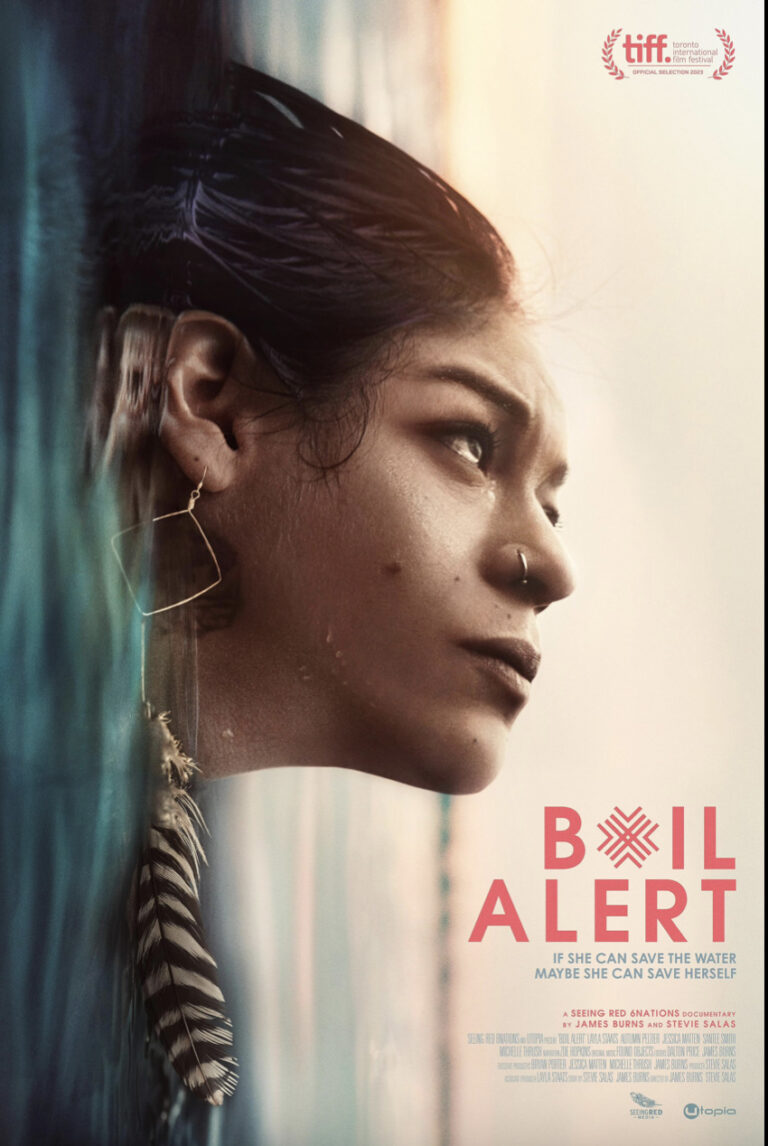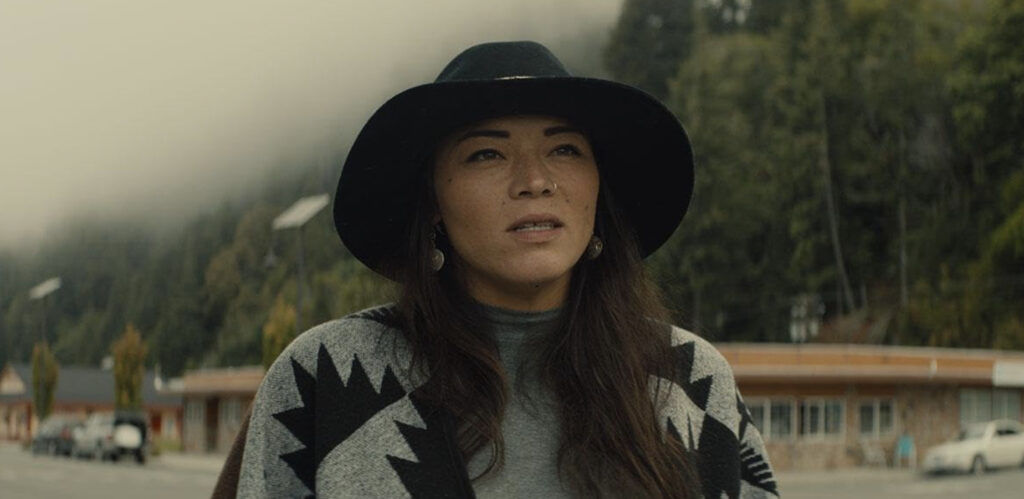
Boil Alert was co-written and co-directed by Stevie Salas (Rumble: The Indians Who Rocked the World, The Water Walker) and James Burns (Vice). The film was produced by Salas and executive produced by Bryan Porter (The Water Walker), Burns, Michelle Thrush and Jessica Matten.
In Boil Alert, activist Layla Staats embarks on a journey through First Nations reservations to highlight the struggles Indigenous people face as they struggle to receive a basic human right: drinkable water. Her poignant exploration illuminates the human dimension of the water crisis in Indigenous communities, as well as the impact it’s having upon Native identity. She also learns about the impacts of boil-water advisories, water toxicity and environmental damage on Indigenous communities.
To follow the water story, Staats visited such areas as Six Nations of The Grand River, Ontario; Neskantaga First Nations, Ontario; Grassy Narrows, Ontario and Wet’suwet’en, British Columbia. The filmmakers also visited Lake Erie, Ontario; Six Nations, Ontario’ and Morley, Alberta to chronicle the determination of the 28 communities in Canada that are contending with long-term boil-water advisories.
Staats also speaks to community members who have never had clean, drinkable water in their lifetimes. As a result, she tracks the journey of the bottled water that is the current solution to boil-water advisories, as she delivers them from house to house, and witnesses all of the unrecycled plastic that’s left behind.
In the process, Staats sees first-hand that Indigenous people’s well-being largely hasn’t been a consideration for non-Indigenous decision makers. As a result, her fight to change that becomes increasingly vital.
Salas generously took the time recently to talk about co-helming and producing Boil Alert during an exclusive interview over Zoom. The filmmaker spoke about making the documentary to help promote its World Premiere next weekend during the 2023 Toronto International Film Festival (TIFF).
 @Boil Alert
@Boil Alert
Q: Along with James Burns, you directed the new documentary, Boil Alert. What inspired you to make the film? How did you approach helming the movie with James throughout the production?
SS: I’m an Indigenous guy. I’ve spent a lot of time in Indian country when I’m not out in the mainstream world, playing guitar with guys like Mick Jagger or making other films.
When I was on a surfing trip with my son in Hawaii, I went to the Pipeline Masters. When I was there, I ran into an old friend of mine from Oceanside, California who had a water charity.
He started telling me about these filtration systems in Fiji and all of these Indigenous villages where they don’t have any clean water. All of these kids were dying, and the number one killer of these children was waterborne illnesses.
So I thought, I have to check this out. So I jumped on a plane and went to Fiji, and went into these villages with these guys.
I realizes they were changing peoples’ lives when they went into these Indigenous villages with these $40 filters. Kids weren’t missing as much school because they were no longer getting sick.
I asked these guys, “How come I’m doing this three-quarters of the way around the world, when I can also be doing this back home in North America?” They looked at me like, what are you talking about?
But they then did some research and called me back two weeks later. They said, “We found 1,100 communities in North America that are on boil alerts.”
So my partner at Seeing Red 6 Nations, Bryan Porter, instantly thought that this was something that we should get into. So we started putting up our own money and teams of people because we no longer wanted to wait for the government to fix these problems.
So we started going in with our own teams of people to fix these water problems. I’m talking about in the bushes up in far-out reserves, where the government is promising people they’re going to help them but they’re not.
So we started doing it. It wasn’t cheap; it cost tens of thousands of dollars to get this stuff in on our own, without any fanfare.
Then my film Rumble came out, and there’s an activist who spent a lot of money with other activists in Washington, D.C. He gets a lot of work done. But he said to me, “Stevie, your film Rumble did more in an hour and 45 minutes than I’ve been able to get done, messaging wise, in 10 years!”
So Bryan Porter and I realized we could use film as a way to spread awareness while also entertaining people. So we could kind of trick people into learning something.
That’s where James Burns comes in. He and i have been working together on some projects on identity with Taboo from Black Eyed Peas. James was at Vice at the time, but we decided to work together on making this film.
I wanted to learn how to become a director because I was already a producer. I said, “I’m not going to go to school because I’m too old!” So I said to James, “I want you to work with me so that I can learn from you.” James also wanted to learn stuff from me, so we decided to take on this project, and that’s how Boil Alert became a project.
Q: What was your experience of also collaborating with Layla Staats to tell not only the overall story, but also her personal journey, in the documentary?
SS: It was something that we talked about a lot. We weren’t sure who we were going to make our main subject at first. But Layla had worked on a short documentary about water on her own, and we were pretty impressed by it.
We told Layla, “If we’re going to do this, you can’t come off as a hero. We need you to be real, and see all of what you’ve really gone through in life. It might be embarrassing and hard for you.”
But she was really willing and brave enough to do it. It was really hard for her, as everyone wants to be seen as a hero. But I told her that she was going to be even more heroic if she shows everyone that she’s feeling the same way that they are.
So it was hard for her, but she believed in it and was able to do it. I don’t think it would be an easy thing for anyone to do because she really had to bear her insecurities and soul.
She had to show that she was scared and had gone through all of these stages in her life to discover who she is as a person. I think that’s a human experience that many of us have gone through…especially as an Indigenous person. You just want to be seen as a person in the same way that everyone else is…So it was hard and embarrassing for her to have to do that, but it was also brave of her.
Q: In addition to helming ‘Boil Alert,’ you also served as a producer through your production company, Seeing Red 6 Nations, which you mentioned earlier. How did you approach producing the film throughout the production?
SS: Producing for me is super easy, but directing is super hard. But I just wanted to try the experience of directing and see what it was like, and learn more about the process.
One of the good things is that I’m one of the owners of the company, so I was able to do it! (Salas laughs.)
The other thing is that James and I have such a great relationship, as we’ve worked on so many things together. So he was really patient with me.
I wouldn’t have taken on the directing role if he hadn’t agreed to be a mentor to me. He said that I was also a mentor back to him, as this was his first feature. But I don’t know if I believe that! I think he helped me a lot.
I believe that if we’re going to be storytellers, we have to learn fast…You learn a lot when you’re around great people. That was my hope as a director with James, and I did; I learned so much.
I’m not ready to be Steven Spielberg, but having my own company…with Bryan Porter definitely helped us. It was about us wanting to say, “We’re going to find ways to create awareness.”
We believe that lack of awareness about the Indigenous world in the mainstream world is more dangerous than almost anything else. Once you create the awareness, people often say, “I had no idea that people are dying of mercury poisoning in these areas, like Grassy Narrows.”…So having our own film company is really about creating awareness
Q: Boil Alert is having its world premiere in the TIFF Docs Programme at the Toronto International Film Festival this Friday, September 15. What does it mean to you that the movie is premiering at the festival?
SS: We’re actually still editing the film (the day of the interview)! We got into TIFF, and we weren’t even close to ready! We didn’t even think that we would get into TIFF since we (were) still editing the film (the day of the interview)! We (had) to turn the film in the beginning of (the first week of this month).
So we (were) going through big cuts (the day of the interview), and signing with a big sales agent. We’re scrambling to get everything finished…but we appreciate the experience!
Having a festival like TIFF accept causes you to have to make decisions. But it also costs you more money because you have to get things done at the last minute, which isn’t great for a documentary budget. So the process has been chaos, but hopefully in the end, it’s going to be fantastic.
You don’t get this opportunity often, but this is actually my second movie that was chosen to premiere at TIFF. My second film, The Water Walker, also got into TIFF. (Boil Alert) is my fourth film, and it also got into TIFF, so I’m doing pretty good!
Boil Alert will have its World Premiere at the 2023 Toronto international Film Festival in the TIFF Docs Programme on Friday, September 15.
Check out more of Karen’s articles.
Here’s the trailer of the film.

